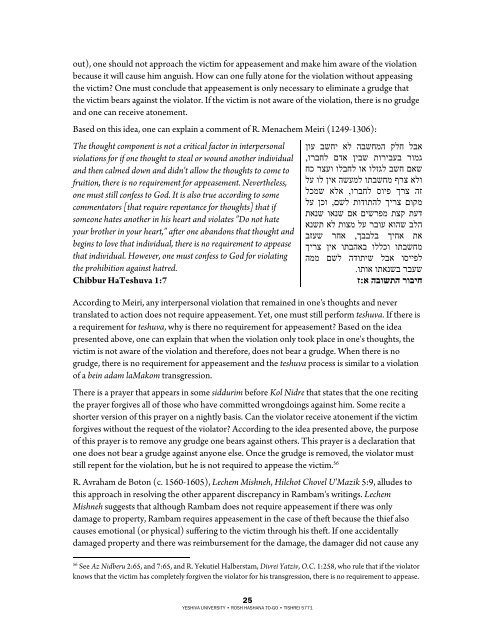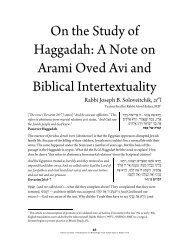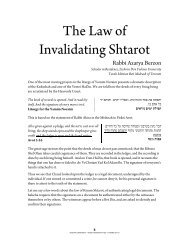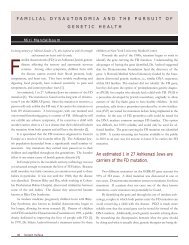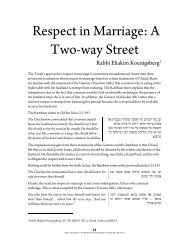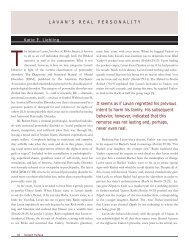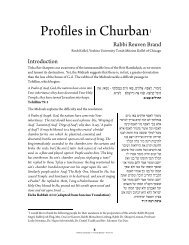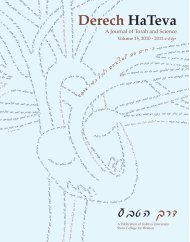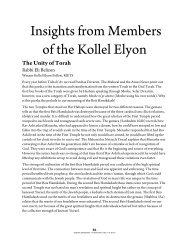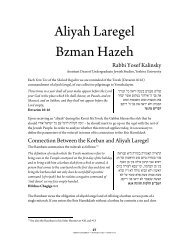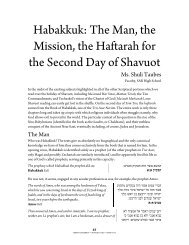YESHIVA UNIVERSITY • ROSH HASHANA TO-GO ... - YUTorah.org
YESHIVA UNIVERSITY • ROSH HASHANA TO-GO ... - YUTorah.org
YESHIVA UNIVERSITY • ROSH HASHANA TO-GO ... - YUTorah.org
You also want an ePaper? Increase the reach of your titles
YUMPU automatically turns print PDFs into web optimized ePapers that Google loves.
out), one should not approach the victim for appeasement and make him aware of the violation<br />
because it will cause him anguish. How can one fully atone for the violation without appeasing<br />
the victim? One must conclude that appeasement is only necessary to eliminate a grudge that<br />
the victim bears against the violator. If the victim is not aware of the violation, there is no grudge<br />
and one can receive atonement.<br />
Based on this idea, one can explain a comment of R. Menachem Meiri (1249-1306):<br />
The thought component is not a critical factor in interpersonal<br />
violations for if one thought to steal or wound another individual<br />
and then calmed down and didn't allow the thoughts to come to<br />
fruition, there is no requirement for appeasement. Nevertheless,<br />
one must still confess to God. It is also true according to some<br />
commentators [that require repentance for thoughts] that if<br />
someone hates another in his heart and violates "Do not hate<br />
your brother in your heart," after one abandons that thought and<br />
begins to love that individual, there is no requirement to appease<br />
that individual. However, one must confess to God for violating<br />
the prohibition against hatred.<br />
Chibbur HaTeshuva 1:7<br />
25<br />
<strong>YESHIVA</strong> <strong>UNIVERSITY</strong> <strong>•</strong> <strong>ROSH</strong> <strong>HASHANA</strong> <strong>TO</strong>-<strong>GO</strong> <strong>•</strong> TISHREI 5771<br />
ןוע בשחי אל הבשחמה קלח לבא<br />
, ורבחל םדא ןיבש תוריבעב רומג<br />
חכ רצעו ולבחל וא ולזגל בשח םאש<br />
לע ול ןיא השעמל ותבשחמ ףרצ אלו<br />
לכמש אלא , ורבחל סויפ ךרצ הז<br />
לע ןכו , םשל תודותהל ךירצ םוקמ<br />
תאנש ואנש םא םישרפמ תצק תעד<br />
אנשת אל תוצמ לע רבוע אוהש בלה<br />
בזעש רחא , ךבבלב ךיחא תא<br />
ךירצ ןיא ותבהאב וללכו ותבשחמ<br />
הממ םשל הדותיש לבא וסייפל<br />
. ותוא ותאנשב רבעש<br />
ז:<br />
א הבושתה רוביח<br />
According to Meiri, any interpersonal violation that remained in one's thoughts and never<br />
translated to action does not require appeasement. Yet, one must still perform teshuva. If there is<br />
a requirement for teshuva, why is there no requirement for appeasement? Based on the idea<br />
presented above, one can explain that when the violation only took place in one's thoughts, the<br />
victim is not aware of the violation and therefore, does not bear a grudge. When there is no<br />
grudge, there is no requirement for appeasement and the teshuva process is similar to a violation<br />
of a bein adam laMakom transgression.<br />
There is a prayer that appears in some siddurim before Kol Nidre that states that the one reciting<br />
the prayer f<strong>org</strong>ives all of those who have committed wrongdoings against him. Some recite a<br />
shorter version of this prayer on a nightly basis. Can the violator receive atonement if the victim<br />
f<strong>org</strong>ives without the request of the violator? According to the idea presented above, the purpose<br />
of this prayer is to remove any grudge one bears against others. This prayer is a declaration that<br />
one does not bear a grudge against anyone else. Once the grudge is removed, the violator must<br />
still repent for the violation, but he is not required to appease the victim. 56<br />
R. Avraham de Boton (c. 1560-1605), Lechem Mishneh, Hilchot Chovel U'Mazik 5:9, alludes to<br />
this approach in resolving the other apparent discrepancy in Rambam's writings. Lechem<br />
Mishneh suggests that although Rambam does not require appeasement if there was only<br />
damage to property, Rambam requires appeasement in the case of theft because the thief also<br />
causes emotional (or physical) suffering to the victim through his theft. If one accidentally<br />
damaged property and there was reimbursement for the damage, the damager did not cause any<br />
56 See Az Nidberu 2:65, and 7:65, and R. Yekutiel Halberstam, Divrei Yatziv, O.C. 1:258, who rule that if the violator<br />
knows that the victim has completely f<strong>org</strong>iven the violator for his transgression, there is no requirement to appease.


